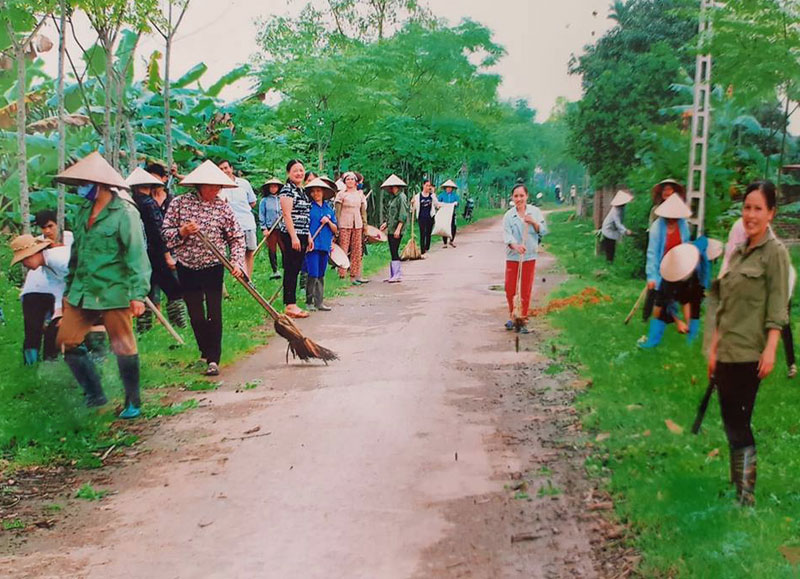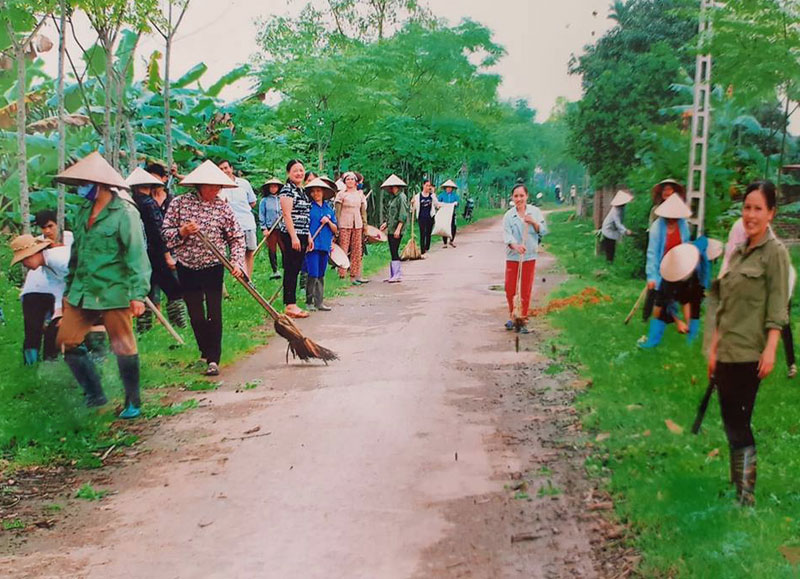
(HBO) – In response to the campaign calling on women to build new-style rural areas, the Women’s Union in Yen Tri commune (Yen Thuy district) of Hoa Binh province have actively participated in joint work to help the commune meet criteria of new-style rural area on schedule, said Chairwoman of the commune’s Vietnam Women’s Union Pham Thi Nhung.

Members of the women’s union in Dong Mai village, Yen Tri
commune (Yen Thuy district) clean up a section of "women-managing road”.
Twice or thrice a month, women’s
unions in villages called on its members and local people to work together to clean
up local roads and remove weeds along the roads. The unions have established 14
women-managing roads and planted flowers along nine roads.
The unions also encourage
its members to donate to a fund to support 180 member households to repair and
re-build standard toilets under the ChoBa project.
In regards to garbage in
agricultural production, the women’s union of the commune persuaded locals to put
pesticide packaging and containers in appointed locations, thus raising their
awareness of environmental protection and building safe living environment.
The union also urged its
members to sort out family garbage, donate land to build roads (As a result, 15
households contributed 1,640 sq.m). Besides, members received assistance to
improve their mixed gardens and renovate houses with total cost of billions of
dong. Unions members contributed working days to dredge more than 280 km of canals
and rural roads.
Women’s unions in villages
have been dynamic in developing production activities. The women’s union of the
commune organised many training courses in side jobs and farming technique for members
every year.
It has devised various
models for economic development to raise women’s livelihood, including a Dien
pomelo growing cooperative in Ninh Hoa village with 24 ha, a model of taro
cultivation in Ao Hay village with the participation of 35 families, the free
range chicken raising model in Yen Xa and Ninh Hoa, and a banana growing model
in Minh Son.
In 2018, the union persuaded
422 local households to merge small rice fields to create large ones of 148 ha.
In addition, the union’s chapters operated six groups borrowing capital from
the Vietnam Bank of Social Policy. The groups provided loans worth more than
5.8 billion VND (248,145 USD) to 335 members. Five other groups borrowing
capital from the Bank of Agriculture and Rural Development, worth over 12.7
billion VND (543,350 USD)./.
The emulation movement "Hoa Binh joining hands to build new-style rural areas” has been widely spreading, becoming a driving force that motivates the localities to renew rural landscapes and improve the material and spiritual lives of the residents. In this movement, the people play a central role-both as the main implementers and direct beneficiaries of its outcomes.
In response to the global digital revolution, Hoa Binh Newspaper is transforming itself into a modern and multi-platform media hub, blending cutting-edge technology with a restructured newsroom and a new generation of tech-savvy journalists.
Hoa Binh province’s Association of the Elderly recently held a conference to review the project on expanding the inter-generation self-help club model until 2025.
In a move to implement Resolution No. 57-NQ/TW, issued on December 22, 2024 by the Politburo, which targets breakthroughs in science-technology development, innovation, and digital transformation, the Hoa Binh provincial Department of Health has issued a plan to roll out the "Digital Literacy for All” campaign within the local health sector.
An Nghia Commune (Lạc Sơn District) is one of the communes that achieved the tha standard of the national new rural area in 2018. Entering a new development phase, the commune is now trying to meet the criteria for the advanced new rural development. With the strong political will and the public consensus, the commune is gradually overcoming the challenges to reach this goal, aiming for the sustainable development.



